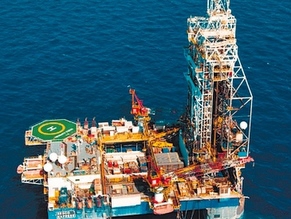|
World Jewish News

A drilling rig in the Leviathan gas field in the Mediterranean. Photo by: Albatross
|
Israel Navy to devote majority of missile boats to secure offshore drilling rafts
09.01.2012, Israel The Israel Navy will be in charge of protecting Israeli offshore drilling rigs, even though this will take up a huge portion of the battleships' operational hours, Haaretz has learned. The IDF General Staff decided several months ago that the flotilla in charge of the navy's missile boats will be responsible for naval patrols between the natural gas fields Tamar, Leviathan and Yam Tethys, including any drilling rigs that might be erected in the future.
Navy officers confirmed that the mission will amount to thousands of hours of missile boats' operational hours each year.
They also said the navy won't be the only force protecting the rigs, which are drilling for oil and natural gas, since the Israel Air Force will have aircraft on alert in case of an attack.
The rigs are located beyond Israel's territorial waters - 12 nautical miles from land - but within Israel's "economic waters," which stretch up to 70 nautical miles offshore. This means that legally, the navy may act to prevent the rigs from being attacked.
"The whole issue of 'economic waters' actually triples the size of Israel, but also creates strategic threats not only concerning the rigs and those working there, but also a threat to Israel's energy supply," said a senior naval officer. "A possible strike against the rigs is a nightmare scenario."
The navy has therefore decided to add two missile boats in the next few years, at the cost of several million shekels each.
Still, according to the IDF analysis, even more sea crafts will be needed to secure the rigs, and the navy is well aware that these operations will come at a cost.
"We'll get more boats for the mission, but that isn't enough," the officer said. "We need even more. It will come at the expense of other things. One can't strengthen the navy in the long term like this. It means changing the operations of missile boats."
The IDF considers the drilling rigs to be potential targets. A senior navy officer in the reserves told Haaretz that the rigs could be "easy prey" for terrorists, or during an armed conflict.
The main method of a possible attack on the rigs include massive rounds of missiles (probably meaning the Syrian Yahount missiles, recently defined by the navy as "game-changing" weapons ), the intentional crashing of manned or unmanned aircrafts, a collision with an approaching water craft, or a maritime explosion.
The navy does not intend to create a separate unit that would function as a coast guard of sorts, but rather split the responsibility among all missile boats. The IDF has recently held maneuvers and exercises in areas surrounding the rigs, but that was done without a direct order stating that their security is part of the navy or IDF's responsibilities.
The drilling companies are responsible for security within the rigs, and they hire private security companies, mostly staffed by former navy and IDF officers. Private security guards might be able to prevent rigs from being taken over, but are unlikely to help them withstand an outright attack.
"I consider securing the rigs an operational mission like any other," said an officer in the missile boat flotilla. "We're talking about an issue of national security with wide repercussions."
By Gili Cohen
Haaretz.com
|
|
